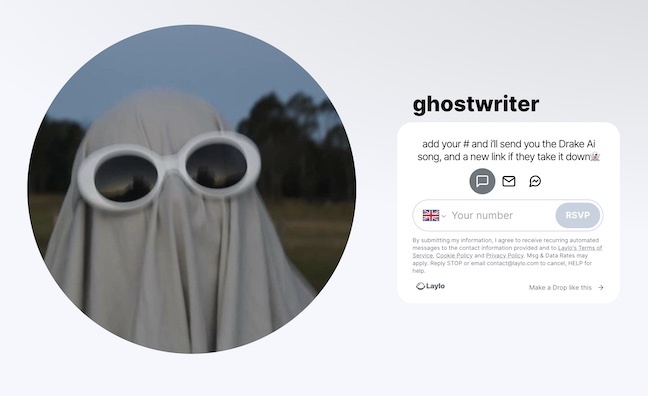The threat posed by AI for music has been high on the industry agenda in recent months.
Following David Guetta’s (unreleased) Eminem-style AI track, which illustrated the power of the technology, now a ‘fake Drake’ track has resulted in a rapid response from platforms.
Heart On My Sleeve, credited to Ghostwriter, racked up hundreds of thousands of plays until it was removed from platforms. The track uses AI tools to mimic music in the style of Drake and The Weeknd.
Major labels executives have spoken about the need for rigorous enforcement of copyright by platforms - as well the opportunities for creativity provided by AI.
Drake has a multi-faceted deal with Universal Music Group covering recordings and more. While the major has not commented directly on the ‘fake Drake’ track, it has made a timely intervention with a statement on AI-generated music.
“UMG’s success has been, in part, due to embracing new technology and putting it to work for our artists - as we have been doing with our own innovation around AI for some time already,” said a spokesperson.
“With that said, however, the training of generative AI using our artists’ music (which represents both a breach of our agreements and a violation of copyright law) as well as the availability of infringing content created with generative AI on DSPs, begs the question as to which side of history all stakeholders in the music ecosystem want to be on: the side of artists, fans and human creative expression, or on the side of deep fakes, fraud and denying artists their due compensation.
“These instances demonstrate why platforms have a fundamental legal and ethical responsibility to prevent the use of their services in ways that harm artists. We’re encouraged by the engagement of our platform partners on these issues - as they recognise they need to be part of the solution.”
As of last night, Heart On My Sleeve had been pulled from Spotify (although it is still visible), SoundCloud, Apple Music, Deezer, YouTube and Tidal. Prior to its takedown, the AI-generated track had more than 625,000 Spotify plays and Ghostwriter had amassed more than 161,000 monthly listeners.
It’s not yet clear why the track has been removed, or the basis of any infringement. Ghostwriter acknowledges the similarities to Drake on some platforms, but not on others. UMG’s statement suggests that platforms are willing to act first, perhaps pending further investigation. The FT reported last week that labels have urged DSPs to clamp down on AI copycats.
Platforms have a fundamental legal and ethical responsibility to prevent the use of their services in ways that harm artist
UMG spokesperson
Despite the takedown from DSPs, Ghostwriter still has a presence on TikTok with 111,000 followers and 2.3m likes. The four videos featuring Heart On My Sleeve on Ghostwriter’s TikTok channel have been played more than four million times - with millions more across the platform.
Although the TikTok account is not verified, it provides a link to Ghostwriter’s page on Laylo - a platform that allows artists to communicate directly with fans about new content. On that page, Ghostwriter boasts to subscribers: “I’ll send you the Drake AI song, and a new link if they take it down.”
Under one TikTok video, Ghostwriter has posted: “I was a ghostwriter for years and got paid close to nothing just for major labels to profit. The future is here.”
The track is also available on Twitter, which remains unlicensed for music.
The issue of AI was discussed last month as the IFPI Global Music Report was launched in London.
Speaking to an audience at the event, Adam Granite, chief executive officer, Africa, Middle East and Asia, Universal Music Group, said: “Music has long managed change, especially technological change. AI is a particularly powerful technology that will change many things in our world in the years to come. To be clear, we're already using AI in so many ways around audience identification, new artist discovery, helping remix old masters to Dolby Atmos.
“We actually have three patents on AI technology already. And in some instances, our artists are using it to help them creatively. Giles Martin just deployed AI technology to help remix the Beatles album Revolver, which sounds great by the way.”
Granite acknowledged the launch during SXSW of the Human Artistry Campaign to confront the challenges for creators from AI. He underlined the fact that use of copyrighted works requires authorisation, and that policymakers should not enable the exploitation of creators.
“As an industry we plan to lean into this new and exciting technology and use it to help further the creativity of our artists,” said Granite. “We very much view it as additive to our industry. That said, we will continue to work day and night to protect the rights of our artists and ensure fair remuneration for real artists.”
The ‘fake Drake’ track is just one of many AI-generated songs that mimic successful artists signed to majors.
At a time when the industry has returned to growth and largely banished the impact of piracy, it now faces a new and potentially more complicated battle with the ever-evolving possibilities of AI.











